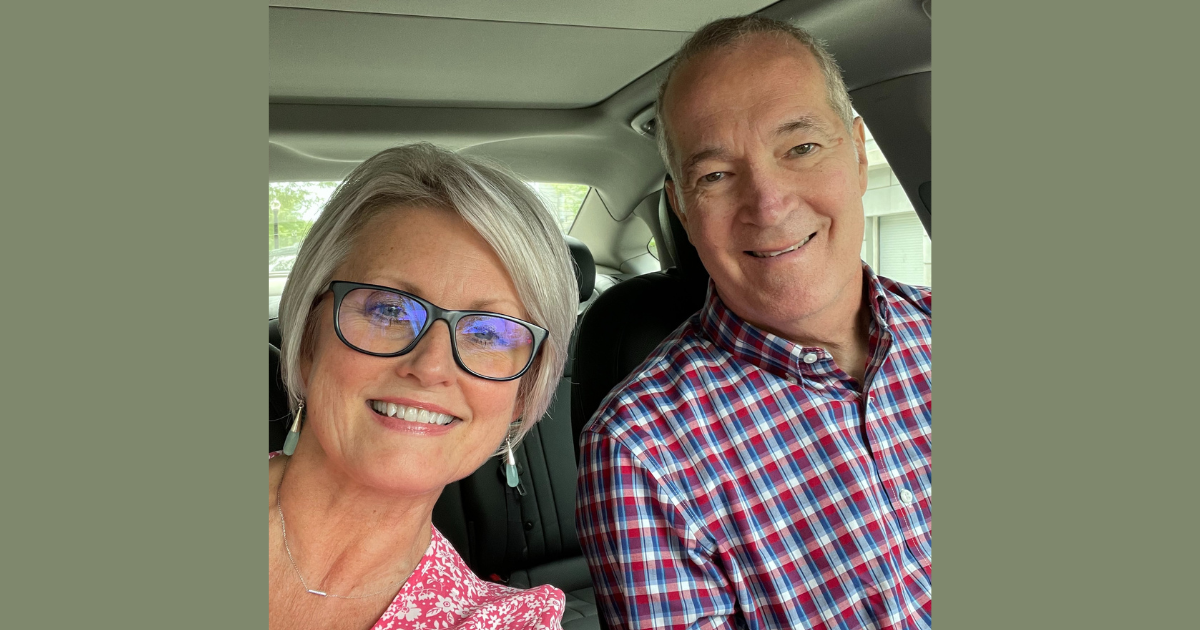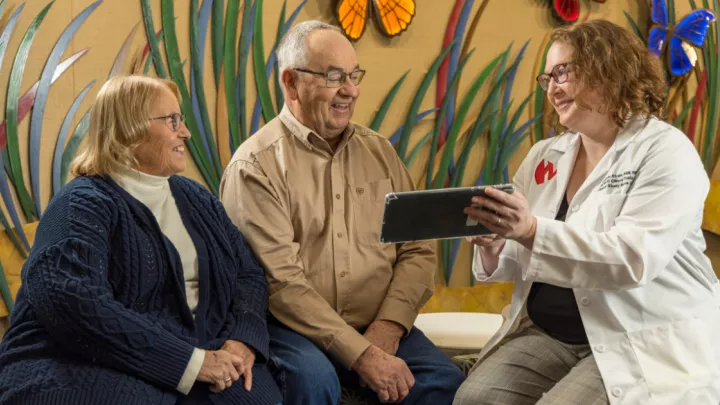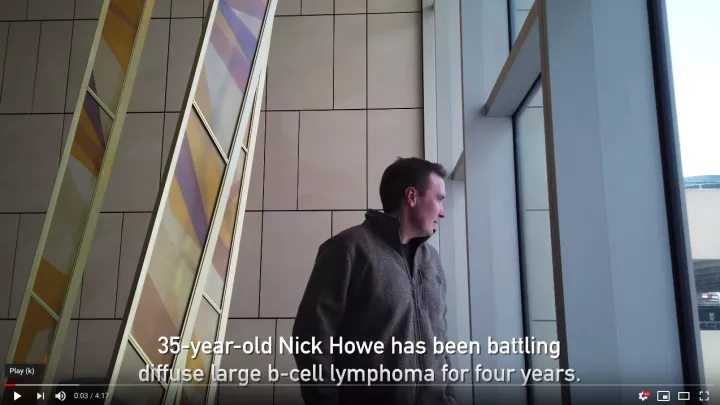A celebration of life for mantle cell lymphoma patient

When Scott and Teresa Hueber celebrated their 40th wedding anniversary this past summer, it was much more than a celebration of marriage.
It was also a celebration of life.
Scott has been in a 10-year battle for his life after being diagnosed in 2013 with mantle cell lymphoma. This rare and aggressive blood cancer starts in the white blood cells of the lymph nodes. It can quickly spread throughout the lymphatic system and to other parts of the body.
Last fall, Teresa thought the battle was coming to an end and had begun to plan Scott’s funeral.
“Scott had been in a coma-like state for a couple of months,” recalls Teresa. “He had always been a fighter. But this time, I didn’t think he would be able to pull through. I was losing hope. I had almost given up.”
But what Teresa didn’t consider was the fact that Scott was at Nebraska Medical Center under the care of a highly experienced team of multidisciplinary specialists who never gave up.
Scott's care began after he was diagnosed with mantle cell lymphoma. After seeing an oncologist in Fort Wayne, Indiana, where he and Teresa resided, his oncologist laid out his options. He would need an autologous stem cell transplant. He suggested three medical centers for treatment but strongly leaned toward Nebraska Medical Center, which has a nationally recognized lymphoma program that specializes in innovative research and clinical trials.
Following his doctor's cue, Scott and Teresa checked into Nebraska Medical Center in June 2013 and began the stem cell transplant process. The transplant was successful, and Scott remained in remission for five years until the cancer relapsed in the fall of 2018. He went on treatment but relapsed again in 2022.
Once again, Scott's oncologist in Fort Wayne encouraged Scott to return to Nebraska Medical Center. We are one of a few in the country performing an innovative therapy called chimeric antigen receptor (CAR) T-cell therapy, used for recurring non-Hodgkins lymphomas, multiple myeloma and certain types of leukemias. The therapy is part of a growing treatment option in cancer that harnesses the body’s immune system to attack cancer cells.
T cells are white blood cells that help the body fight infection and cancer. In some patients with lymphomas, multiple myeloma and certain types of leukemias, the T cells don’t recognize the cancer as abnormal which allows the cancers to grow. CAR T-cell therapy involves removing the patient’s T cells and restimulating them in a lab to fight their lymphoma. After chemotherapy, the modified CAR T-cells are infused into the patient, where they multiply, attack and kill the cancerous cells.
In 2015, Nebraska Medical Center was involved in early research and clinical trials in developing this new therapy. It began offering it to patients in 2018 when it received fast-track approval from the Food and Drug Administration.

“We have made great strides in improving and expanding this therapy over the past five years,” says Julie Vose, MD, Nebraska Medicine hematologist-oncologist. “It has been approved for the treatment of some types of leukemia, multiple myeloma and non-Hodgkins lymphomas, and we can now use it earlier in the course of the disease. We’ve also learned how to reduce and better manage many of the side effects of treatment.”
“Nationwide, remission rates for mantle cell lymphoma two years out following CAR T-cell therapy is approximately 60%,” says Dr. Vose, “and 40% to 60% for other types of non-Hodgkins lymphomas, multiple myeloma and leukemias.”
One of the rare side effects of this treatment is a condition called neurotoxicity. This condition causes inflammation of the brain that can result in complications such as seizures, confusion, paralysis or weakness of the limbs, loss of memory and cognitive function.
Unfortunately, Scott was one of those patients. Scott’s organs began to fail. He was put on a ventilator and had to be fed intravenously. Teresa sat by his bed day after day. “I kept talking to him and moving his body,” says Teresa. “But there was hardly a response from him.”
But then, miraculously, around Thanksgiving, Scott began having short bouts of alertness. They gradually became more frequent and longer.
“Less than 4% of patients will have a case as severe as Scott’s,” says Dr. Vose. “But thanks to our very specialized multidisciplinary team of experts, we were able to provide the necessary care to help Scott get through it.”
“If it wasn’t for God, my wife, and the medical staff at Nebraska Medical Center, I wouldn’t be here today,” says Scott. “The excellent care by their medical team and skilled nurses and doctors were critical to my recovery.”
By the time Scott was ready to leave Nebraska Medical Center he had not been out of bed for eight weeks. He had lost most of his muscle function. He couldn’t stand or even swallow. Scott checked into an Omaha rehabilitation center in mid-December. He began the slow process of relearning how to walk and regain the function of his limbs.
“I could only walk a few feet at first with a walker,” recalls Scott. “But within three weeks, I could walk a few hundred feet with a walker.”
Scott returned to work in January and has regained much of his function but is still working on getting back to full physical capacity.
It’s been a long, hard battle, but the news that he is now 100% in remission motivates Scott to keep pushing forward. “I’m looking forward to having more stamina and being able to run and play with my grandkids,” says Scott. “After all, I have 10 grandchildren to keep up with.”
Scott and Teresa say they are very thankful their journey led them to Omaha.
“We are so grateful for all the care we received from Dr. Vose and the sixth and seventh-floor medical staff,” says Scott. “It was a long way from home, but I’d go back if we had to do it all again. I don’t know if anyone else could have gotten me through it. They just never gave up.”







